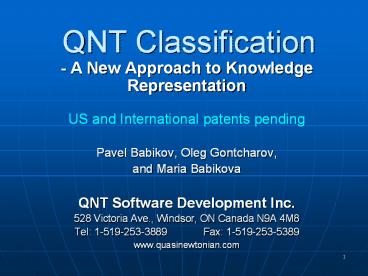QNT Classification - PowerPoint PPT Presentation
Title:
QNT Classification
Description:
General polyhierarchical structure no global separation of classification ... A Fragment of Generating Polyhierarchy for Classification of Means of Conveyance ... – PowerPoint PPT presentation
Number of Views:37
Avg rating:3.0/5.0
Title: QNT Classification
1
QNT Classification
- - A New Approach to Knowledge Representation
- US and International patents pending
- Pavel Babikov, Oleg Gontcharov,
- and Maria Babikova
- QNT Software Development Inc.
- 528 Victoria Ave., Windsor, ON Canada N9A 4M8
- Tel 1-519-253-3889 Fax
1-519-253-5389 - www.quasinewtonian.com
2
Requirements to Classification Scheme
- General polyhierarchical structure no global
separation of classification aspects - Persistence of the polyhierarchy no dependence
on actual set of classified objects - Compactness of description no explicit
enumeration of categories - Intrinsic support of set theory operations when
forming classification categories - Efficient realization of test for distance
inheritance no combinatorial search - Conceptual simplicity no application-specific
program codes or cumbersome descriptions
3
Classification Criterion Atomic Specialization
Aspect
Criterion Ck
Ck Pk(i), i 1,2,...,Nk i branch
number Nk cardinality Pk(i) true / false
Pk(i) ? Pk(j) false for i ? j Elementary
attributes ak(i) Ck, i Pk(i) true
Criterion branches
4
Conjunctive Classificationsby Systems of Criteria
5
Trees and Facets - ClassicConjunctive Schemes
6
Common Disadvantages of Trees
- Mandatory ranking classification criteria the
predefined path problem - Massive duplication of criteria in parallel
sub-trees the subtrees multiplication problem - Purely conjunctive logical structure no
intrinsic support for disjunctions and negations
7
Common Disadvantages of Facets
- Global separation of classification aspects
- The same predefined path and subtrees
multiplication problems within facets - Purely conjunctive intrinsic logical structure
within facets - Inelegant and cumbersome formalism supporting
non-intrinsic features
8
Our Approach
- Generalize formalism for building classification
in terms of elementary specializations by
criteria - Develop purely synthetic poly-hierarchical
classification scheme based on partially ordered
criteria
9
- Category can introduce more than one
classification criterion - Any applicable criterion can be used for further
specialization
10
- Classification categories are described by
logical formulae containing conjunctions,
disjunctions and negations
11
Generating Polyhierarchy is Established by
Dependence Relationships Between Criteria
12
Generating Polyhierarchy of Criteria Implicitly
Defines Induced Polyhierarchy of Categories
13
A Fragment of Generating Polyhierarchy for
Classification of Means of Conveyance
More Complex Example
14
Advantages of the Method
- It satisfies all six requirements to
classification scheme, listed above - It provides very general and mathematically
rigorous formalism for manipulating complex
hierarchical information structures - It uses very simple system of basic notions,
without requiring special knowledge for
implementation - Target polyhierarchical classification is
directly representable by DB structure no
programming required!
15
Fields of Application
- Taxonomical, expert, logistic, and content
management systems - Enterprise resource planning and project
management systems - Application-specific data and knowledge bases
- Machine learning and AI systems
- Intelligent control systems and robots
- Electronic lists, catalogues and directories
- Internet search engines
- Online documentation and help subsystems
- Components of computer OS and compilers
16
Contact Information
- QNT Software Development Inc.
- 528 Victoria Ave.,
- Windsor, Ontario
- Canada N9A 4M8
- Tel 1-519-253-3889
- Fax 1-519-253-5389
- babikov_at_quasinewtonian.com
- gontcharov_at_quasinewtonian.com































